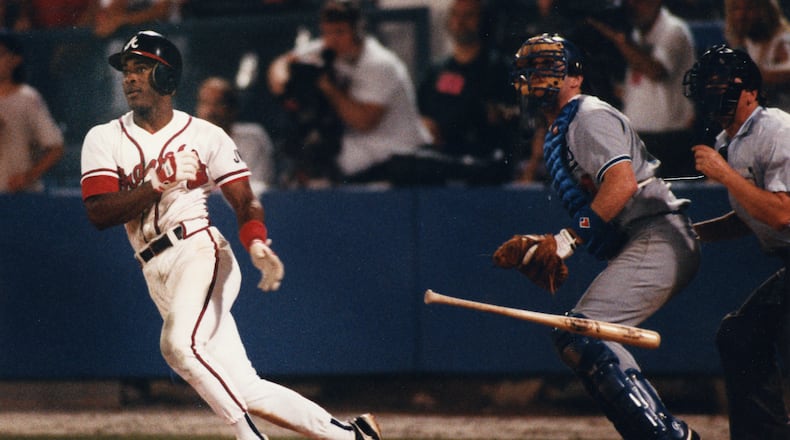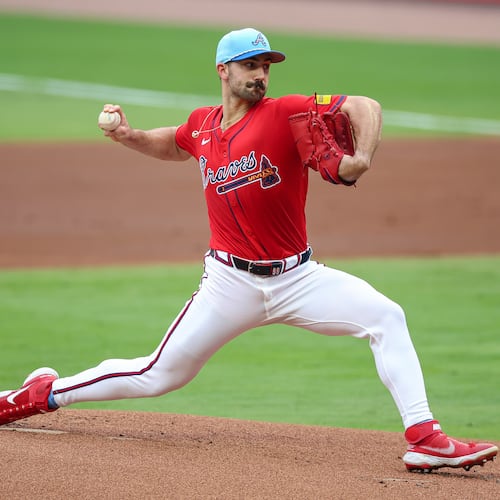What he did: Ron Gant was there at the beginning of the great run for the Braves. He was a young, well-built, power-hitting outfielder who played 14 seasons in the major leagues and figured prominently in the club's first two trips to the World Series.
He always was very popular in the organization, a favorite of Hank Aaron and signed one of the richest baseball contracts at the time after the 1993 season (one year for $5.5 million). But he didn’t play on the world championship team in 1995; his career in Atlanta came to an end after breaking his right leg in a dirt bike accident. The Braves released him and he didn’t play again until ’95, going to Cincinnati before playing for six more teams and retiring after a short season in 2003 with Oakland.
Gant came out of Victoria, Texas, where the Braves drafted him out of high school (fourth round, 100th overall, 1983). He played football at Victoria High, but his sport was baseball, and he was heavily recruited by the college baseball powers in the area such as Oklahoma and Texas. However, he turned pro and his first three years in the minors were quiet ones.
In 1986 at Single-A Durham he played second base and hit .277 with 26 homers and 102 RBIs and stole 35 bases. At the time, the Braves realized they had something special and he played a full season at Double-A Greenville before getting a September call-up in 1987, when he hit two homers and drove in nine runs in 27 at-bats.
The next year Gant made the major league club out of spring training and played in 146 games, hitting .259 with 19 homers and 60 RBIs for a team that lost 106 games. He struggled early in 1989 and with the fact that second baseman Mark Lemke was ready to play in the majors, Gant was sent to Triple-A Richmond to finish the season and learn how to play the outfield.
Gant made the transition and came back to Atlanta in 1990 and hit .303 with 32 homers, 84 RBIs and 33 stolen bases and was named the National League Comeback Player of the Year. Along with Lemke, Jeff Blauser and David Justice, Gant was in the middle of the core of the team’s young bats that helped lead the resurgence in 1991.
Gant also will be remembered for his encounter with Minnesota first baseman Kent Hrbek in Game 2 of the 1991 World Series when the big first baseman lifted him off the base. Gant was called out in what was the most controversial play of the seven-game series.
From 1991-93, Gant’s batting average dropped somewhat, but he produced 32 homers and 105 RBIs in ’91 and 36 homers and 117 RBIs in ’93. In 1993, when the Braves finished with 104 wins and one game ahead of San Francisco, Gant may have had the biggest hit of the season. During a game against Cincinnati on Sept. 1, the Braves trailed going into the bottom of the ninth, but Gant blasted a walk-off home run off “Nasty Boys’’ reliever Rob Dibble, who will remembered for that moment when he ripped his jersey off in disgust while walking off the field.
The Braves rewarded Gant with what was then the biggest one-year deal in baseball history but then came the dirt bike accident in the offseason. Gant’s injury brought a large group of media to Piedmont Hospital as fans around Atlanta wanted to know what the prognosis was for one of their favorite players. It wasn’t good as the right leg was severely damaged and a rod had to be put in to repair the compound fracture.
The Braves had a business decision to make, and citing the stipulations of the contract which Gant broke by riding a dirt bike, the club released him and paid him about $900,000 in termination pay. Though Gant had some productive years after the injury, he was never quite the same.
Where he lives: In a few weeks, Gant, now 50, will marry for the second time (Leslie Donatelli). He lives in Suwanee and has four children from a previous marriage: Son Ryan (20) and daughters Alexus (16), Symara (14) and Halyn (10).
What he does now: Gant is out of baseball and sports, but is still in television. He is the co-anchor of "GoodDay Atlanta" with Gurvir Dhindsa and Buck Lanford on WAGA/Channel 5 and still plays a lot of golf and can be seen at Braves alumni events.
On his morning television gig: "It's interesting how it happened. They called my agent a few years ago and wanted me on to talk about the Braves in the morning. I was doing a game the night before and it was a long rain delay and I wasn't even going to go in and do the segment, but I sucked it up and did and a few days later they contacted my agent and wanted to bring me onboard. It was a tough decision to stop doing baseball, but I took a leap of faith and I am now up at 4 in the morning and at the station by 5 and on the air at 6. I never thought I would end up on this side of the media, but I think it helped that when I played I tried to be inviting to the media. I was cordial and it paid off. I am growing as a news anchor and I enjoy doing community stories, but I still have a long ways to go.''
On his early years in the minors with the Braves: "Chuck Tanner was the manager and we still had Dale Murphy and Hank Aaron was around a lot. I was in awe of those guys. Bobby Cox was the general manager, and I noticed he was bringing in one young player after another. Then came John Schuerholz, and it all just came together. We knew then we were going to be good.''
On his move from second base to outfield: "It was the best thing that ever happened to me. I thank Bobby for that because we had Lemke and some really good infield prospects and knew I could use my speed in the outfield.''
On his relationship with Hank Aaron: "I think Hank looked at me and saw a lot of himself. I was a right-handed hitter, not real big and had power. I learned so much from him and every time I was around him my jaw hit the ground. He was my idol and just to see what he had to endure throughout his career is incredible and his numbers never declined despite having the weight of the country on his shoulders. It was a special relationship.''
On the dirt-bike accident: "I was on dirt bike doing jumps and lost control and went off the course and my leg just wrapped around a tree. Right when it happened, I knew I had messed my leg up and possibly would never play again. A million things ran through my mind as I lay in that hospital. The Braves made the right decision letting me go. They were able to get a lot of the money back because of the clause in the contract. It all worked out, but the thing I regretted was I wanted to be a Brave my entire career.''
On the home run against Dibble: "I am thinking for sure that he was going to come at me hard. His slider was hard enough, but I used a huge bat that weighed 36 ounces and all I had to do was get the bat out in front of it and it was going to go. I remember the ball bouncing off the fence in left. A lot of people come up to me and tell me they were at that game.''
On being part of the Braves' legacy: "It means everything to me. I was a part of seeing a city change and was a huge part of that.''
On his reputation of staying out of trouble and now being a role model: "I have to credit my parents for that. My dad was army, and my mom worked all day and then came home and cooked and cleaned for all of us. Also, my friends were always really good guys, and they were not going to let me get around drugs, weapons or women that were going to get me in trouble. I always try to surround myself with good people.''
About the Author
Keep Reading
The Latest
Featured



